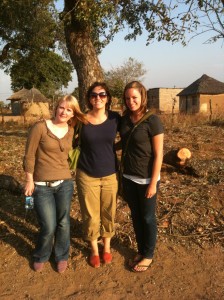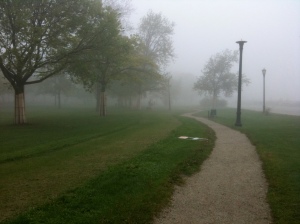Gifts and Oceans
 I’d like to tell you about my friend Gift. I stayed first at her home before moving into my current homestay in Clare. She slept in the same room with me for three nights and I feel like I know her better than anyone in the village. She’s my oldest friend here! Gift and I would talk during about every waking moment that we were both at home and communicate as best we could across languages and cultures about religion, politics, agriculture and education. She is the one who read the 700+ page Long Walk to Freedom in about a day—while also keeping up cleaning her house, collecting water, cooking meals and preparing clothing for her brother’s wedding.
I’d like to tell you about my friend Gift. I stayed first at her home before moving into my current homestay in Clare. She slept in the same room with me for three nights and I feel like I know her better than anyone in the village. She’s my oldest friend here! Gift and I would talk during about every waking moment that we were both at home and communicate as best we could across languages and cultures about religion, politics, agriculture and education. She is the one who read the 700+ page Long Walk to Freedom in about a day—while also keeping up cleaning her house, collecting water, cooking meals and preparing clothing for her brother’s wedding.
I went by to see Gift today to check on her and perhaps retrieve my (already borrowed) Kindle. When I arrived, she wrapped one arm around me and explored my face with a huge smile, saying, “You are well.” I couldn’t tell if it was a question or declaration, but her face beamed. I’ve spent the rest of the day wishing I could be better at showing such unabashed caring.
—-
Later in the day, a man sitting with some women outside of a house I’d passed many times, approached me for a hug. This was not unusual for older, drunk men I’ve encountered, and thus far I’ve found it easiest to endure a brief embrace and walk on. This time, he continued to try to hug me and leaned to try to kiss me, as well. At that point I shoved him and reprimanded him with words that hopefully someone nearby later translated for him. I don’t tell this story to a) freak out my mom, b) lead anyone to believe all older or drunk men in South Africa/Africa/rural places/foreign countries are like this or even dangerous, c) share a cautionary tale. In fact, he was harmless, and I knew that. However, he was inappropriate and he did need to be told that.
Much to my surprise, Ocean, one of the younger men in the village who is probably about 25, came to greet me after helping translate all day for my students. He immediately addressed what had just happened in the street—he must have heard about it from others who saw it happen. He apologized on behalf of Clare and asked if I wanted the man arrested. Ocean was clearly both concerned for my safety and embarrassed that someone in his community had disrespected one of his “guests.”
—-
Both Gift and Ocean have played very important roles in my understanding and appreciation for Clare and the people in it. Knowing them well allows me to know that the afternoon incident was an anomaly and one that almost every member of the community would be appalled by. The way Ocean stepped in hoping to protect me and the way Gift embraced me with her warmth embodies for me the essence of the Clare I’ve known so far. One that is proud of its people, enjoying the gifts that the community possess, acknowledging the hard parts of life here and essentially discarding them—saying, that does not represent who we are. I’m thankful that through their quiet strength, Ocean and Gift showed me how we are starting to truly be accepted into the community.
—-
The students are getting itchy. They are ready to start building businesses and choosing partners. They are ready to act. However, we still have time we are meant spend understanding the community, the assets that are already here, the ones we brought with us and how we can build sustainable businesses with community partners. Both experiences today taught me that this time is maybe more important than the building that comes later. Now we are building trust, relationships, hope and respect. If we do this well, once we leave, those villagers who continue on with the enterprises we’ve started together; they will trust in the process, defend what they had a hand in building and beam with pride at what they’ve accomplished.
How Immersed is Immersed Enough?
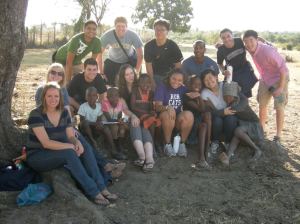 I’ve been thinking a lot this week about what it means to fully know a person, a place, an idea. Our ThinkImpact phase this week is Immersion. The students do a variety of activities to help in understanding the culture deeply and quickly. Thanks to some ideas from IDEO and a number of other smart folks, our students went forth armed with tools to become Immersed. They did this by watching, engaging and quite literally getting their hands dirty in the daily life here in Clare, South Africa. Some aspects of these activities involved:
I’ve been thinking a lot this week about what it means to fully know a person, a place, an idea. Our ThinkImpact phase this week is Immersion. The students do a variety of activities to help in understanding the culture deeply and quickly. Thanks to some ideas from IDEO and a number of other smart folks, our students went forth armed with tools to become Immersed. They did this by watching, engaging and quite literally getting their hands dirty in the daily life here in Clare, South Africa. Some aspects of these activities involved:
- Impromptu language lessons
- Laying the foundation for a house
- Carrying water
- Sitting in on classes at the high school
- Speaking with the owner of the biggest shop in town, and the only Pakistani resident of Clare. [For some reason the first 3 days we were continually told to go to the Indian Shop]
- Grinding peanuts by hand
- Learning how to cook—college aged men, I’m looking at you. Learn it now, the “real world” will not teach you and fast food is both bad for you and not available in awesome rural African villages where you may want to go.
- Endless conversations with villagers asking why we are here. Why Clare?
Beyond these activities though, how can one become fully immersed in a place. Are we meant to get to know a place through its people? the leadership? history? politics? food and language? sport? education systems? economy? transportation (here, that one is easy: feet! and a few terrifying taxis)? religion? Do we need to know what people read? How they bathe? How they obtain food? Do we need to get it under our skin? our nails? In our hair? [the last two we’ve definitely done whether we meant to our not] How deep is deep enough to go?
I am humbled daily here by the growing knowledge of my own ignorance. While I may know parts of Africa better than some, I have barely scratched the surface. These activities have actually helped us to answer almost all of the above questions about Clare—an impressive amount of information for 3 days of program work. The reality is though, without the people who live here, we would still be lost. They are the ones who can tell us what will truly work when we begin to think about creating businesses that could thrive in this sleepy village. Thankfully, ThinkImpact thought of that, and approaches development by including those who are meant to reap the benefit of it. We are all itching to get to the partnership phase of this process and start building business plans, but first, we need to keep digging deeper. We need to know more. And once we are downright soaking wet immersed, then we can step back and start to learn from what we’ve gathered. More on that next time!
——–
Some quick asides about me and follow ups to the last post:
- My host sister who started a Long Walk to Freedom via borrowed Kindle has almost finished it. She’s been reading for about 1.5 days. It is over 700 pages. Amazing.
- In our language lesson today one student said the thing he needed to know how to say most was “You are a genius.” Everyone concurred.
- 24/7 jobs are intense. Which means, if you are a mom, God bless you.
- I’m not the only one here who thinks that 50 degrees is super cold winter weather! At last! Maybe I’m African?
- Around the house I’m now known as “Sister Susie.”
Dive In.
 Y’all. Culture shock is not joking around with us this time. Since I last wrote I have:
Y’all. Culture shock is not joking around with us this time. Since I last wrote I have:
- Taken 2 bucket baths
- Taken 2 days off of bathing (if you know me, you know this is a big deal. I like clean.)
- Met at least 50 community members of Clare, South Africa—I think there are only 100 or so more. Not really. Maybe.
- Talked about Mandela’s “Long Walk to Freedom” with my bachelor-degree-holding host sister over a mouse fight in the roof beams of her ceiling-less (roof, no ceiling) house.
- Fallen asleep to cows, chickens, goats, dogs, and a variety of other noises that I’d rather not have identified.
- Seen the Milky Way. Every. Night.
- Warmed my icy toes with the genius boiling water in the waterbottle in the bed method.
- Set up and got stood up for at least 7 meetings.
- Learned a passable amount of Xiangan [I should know how to spell this, but I’ve only heard it spoken, not written]
- Gotten laughed at for even speaking Xiangan.
- Gotten a drumming and dancing lesson. Again, got laughed at.
- Asked many awkward “how do I…use the restroom, bathe, eat this, clean this?” questions.
- Befriended two precious 3 year olds. One of which at first thought I was going to kill her because I was white. Apparently she’s over that now.
- Learned how to make mealie pap (a sort of corn meal porridge).
- Brought a group of 10 Northwestern and 1 Stanford students to a quite rural village of South Africa to learn about social enterprises and asset based community development. Which they are now trying to explain to their host families in the simplest English they know how.
- Gotten freaked out that I’m not cut out for the next 3+ years of my newly made life plan.
- Decided that freaking out was lame and diving in to the completely awkward and awesome first few days of life here was much more fun.
Now let’s just hope I can get all of my students to that last one.
Thanks to an excellent friend’s encouraging phone call and another excellent friend’s encouraging blog post, I think I’m set. Let’s do this thing. And let’s love the heck out of some people on the way. After all, I’m pretty sure that love is pretty much the same in every country.
We’ve Arrived!
[Written on Friday 6/24]
Oh hi, I’m in Africa! Again. I’m not quite sure what I did to deserve this life, but I hope I can keep it up.
Kathrin (my coleader) and I arrived safely and with all bags (if you’ve been following any of my recent international travel, this was a new and fun surprise for me). The students will join us in the village on Tuesday and we head there today (Friday) to get some initial preparations in place. While we were happy to arrive safely and with all belongings, at least 3/4 of our things were soaked from a rainstorm in Atlanta before we left. Apparently Delta had our bags sitting in a storm drain until they loaded them on the plane…so we rapidly draped every surface in our room with damp clothes before we went to the hotel casino for dinner.
Much like one defaults to the foreign language they know best in a new travel situation, I default to the place on that continent that made the biggest first impression on me when I arrive again. For Europe, London and Rome are my go to comparisons. For Africa, it is Rwanda. While my brain knows that east Africa and southern Africa, most especially South Africa with its inclusion in the BRICS countries and relatively booming economy, are vastly different, somehow both times I’ve arrived in South Africa there is a small amount of…”Really? This is Africa?”
Kathrin and I were discussing yesterday as we walked through the overly thematic Emperor’s Casino what development can look like in different places. We are working this summer on building businesses in partnership with rural communities, but to what end? What will they want their development to look like? In Cape Town, I felt like I was in San Francisco, and in the hotel last night, Las Vegas came to mind. While I don’t love the idea of African development growing communities to look more “American,” it is not really up to me. It is more up to me not to make comparisons at all, but to just accept what I see. At the same time, I hope that during my time here through the way that I live in the village, I can help to convey what I hope my life and my communities can become and hope that some of those ideas jive with the local view or that the local view can help influence my ideas.
Anyway, we start our homestays tonight and today we travel through gorgeous farmland, mountains and valleys. Can’t wait to let you know how it is!
P.S. For a more program oriented post check out the ThinkImpact blog where we will be posting about our training.
Give It Up
“Pretty good, for an old guy.” This was my grandfather’s consistent reply each time I called to check in during the last decade. This response always made me laugh—he wasn’t ignoring or trying to justify his age, he was embracing it. His reply always came with the same slight smile I could hear on the other end mixed with just the right amount of sarcasm.
My grandparents were in a word: generous. They showered us with tales of the past and unswerving support of our education. In their mind, an education was the most valuable asset they could provide.
Grandfather came from a time when he would hunt during the depression for his family to have meat on the table for dinner, but the grandparents I remember were often surrounded by chef prepared meals and rich jazz music. They knew lean times and because of it, lived it up when they were able. My grandparents taught me about generosity and embracing where you are in life. To be lavish when lavishness is possible and to hold constant to those you hold dear. Grandfather’s constant mantra will help remind me to be positive about where I am, laugh at that place, even when it hurts and to recognize that I can’t change my age, but I can embrace it and those around me.
Recently, I heard a great talk on generosity. The principles of generosity were laid out as: Give first, Give to those who can’t repay and Generosity costs. My grandparents gave generously. They sought out something good for me that I didn’t know I wanted and gave it to me first, without me asking for a thing or initiating any giving. Clearly, as a child, I could not repay. They weren’t expecting anything in return for their giving. Finally, generosity cost them. Increasingly, they made choices that would enable to them to contribute more substantially to supporting their grandchildren’s schooling.
The talk also spoke about barriers to generosity, like the fear of your giving being wasted or unappreciated. As I step into my internship in rural Africa with ThinkImpact, the idea of generosity is very much on my mind. Coming from a nonprofit background, my intrinsic motivation to work has been giving, in a way. However, ThinkImpact’s model is that of a social enterprise—a delicate balance between income generating pursuits and positive social impact. The more MBA education I receive, I can see the incredible impact that business makes. It is more sustainable and is often held more accountable than the nonprofit sector—and all the better that social benefit is imbedded in it.
Where does generosity fit here then? How can I give first, to those who can’t repay and acknowledge the cost of my own giving without compromising the principles of the bottom line—even a blended social and economic one? What fears do I have that my giving will be wasted or unappreciated? For now, I have decided to respond like my grandfather. I will acknowledge honestly where I am and where I am going. I do not have the answers to solve poverty, but ThinkImpact has given me some of the tools. I do not know the community I will step into, what their assets are and what type of businesses they would like to begin in their own communities to combat which social challenges, but social enterprises can address these questions if approached in a transparent partnership between cultures and skill sets.
During this experience, I will be guiding students through a curriculum where they will learn how to partner with local community members to create social enterprises. I think this is where I can give as generously as my grandparents did for me. I can pour our my knowledge of other cultures, problem solving skills in what can be uncomfortable travel situations and ultimately be a support as these students to learn about the assets that the community and they themselves possess. When we return after two months in country, I hope that we can confidently respond that we did “pretty good.”
I Want to Go to There
…Continued from Get Going
When people look at my resume, the first thing they ask me is, how did you go from art to business? I smile because while it may not by fully apparent by my resume—as much as I work to tell my story through it—my path has actually been such a perfect progression for me to get to where I’m going. I earned my BA in Studio Art and Art History from the University of Virginia, a place so beautiful and historic, that I simply couldn’t help but studying those passions. I still feel that I learned more about politics, history and human nature from studying art than I ever would have studying political science or sociology. My time at UVA gained me one of the best hard skills that a liberal arts degree can—to think. That, and my OCD, did the rest to lead me to full time roles organizing things and people.
Get a Job
My first job organizing international internships for students going to Italy, Spain, the UK, France and Australia introduced me to a boss in whose footsteps I’ve been trying to follow ever since. He has now encouraged me into the two best decisions of my life: going to Rwanda on a 10-day service-learning trip, and going to Thunderbird for my MBA. My next job at the Case Foundation taught me about social media and the importance of the everyday philanthropist—another tie into Novogratz’s book—while also introducing me to a group of people with big hearts and big connections for change. Once I landed at College Summit, I was ready to use my skills to see real change in the everyday of my work.
Change at Work
My time at College Summit exposed me to what a well run nonprofit can look like. Like any organization, is it not without room for improvement, but it has done a superb job of hedging mission creep with clear goals and measurable results. Metrics, along with the strong relationships built with students and between staff members, paint a clear picture of what a small group of passionate people with achievable goals can do—send more students to college who might not otherwise go. Ask any College Summit Peer Leader, and I bet their experience was life altering in the best possible way.
I felt the same way about my College Summit experience. While I was there, I fed my passion for International Development by leading a board for Indego Africa. It is a NY based nonprofit working in Rwanda with cooperatives of women who make handicrafts, import and sell the crafts in the US and 100% of profits return to the women for education and business training—social enterprise at its best. Through my involvement with both of these organizations, it became apparent that if I wanted to progress and lead in the International Development and nonprofit fields, I would need some deeper practical skills and understanding of the global landscape. My Thunderbird MBA has provided that in many expected and unexpected ways.
Dream On
As I prepare for my time in South Africa at ThinkImpact’s Innovation Institute, I am also reading Change by Design by Tim Brown. He started IDEO, a design thinking consultancy now expanding even further into the social sphere under the leadership of a Thunderbird Alumna (we’re everywhere, if you didn’t know!). One of the first things Tim mentions is the need for more “integrative thinking” and design thinking throughout organizations. He puts forth that the most effective thinkers will be those that can pull from multiple disciplines—artists with MBAs, as an example—music to my ears. While I don’t yet know in what ways my time in South Africa will change me and the people I work with, I do know that I will be well used and deeply moved as I have been so much this week. Because when dreams start to be lived out, you can do little more than jump in, enjoy the ride and shed tears of grateful joy that you are finally getting to where you were always going.
Get Going
I have been moved to tears more times than I’d like to admit this week. There have been numerous unexpected and sometimes unwelcome changes in my life perhaps helping to create a more emotionally in-tune mood, but most tears have been of deep joy, gratitude and humility. Ironically, while resisting every change coming into my own life, I’ve read with fervor about how to create positive change to address poverty. Perhaps I need to look a bit more closely at my own areas of “poverty”—but more on that another time.
Changing the World through Acronyms
Today I finished Jacqueline Novogratz’s The Blue Sweater, about her life up to and including founding Acumen Fund after many amazing experiences in Africa. In it, she makes the case for using the market as one of many important tools to address poverty. This summer, I get to participate in that very approach to development.
I leave for two months in rural South Africa in about a month. I will be working with an amazing nonprofit, ThinkImpact, and the book was part of our required reading. ThinkImpact has done nothing but impress me so far with their inclusive approach to social entrepreneurship in development. Our work as Advisors will be to teach ThinkImpact Innovation Institute Scholars (American undergrads—mine will all be from Northwestern’s Global Engagement Summer Institute (GESI)—go cats!) about social entrepreneurship. The Scholars use IDEO’s Human Centered Design Toolkit and partner with local villagers to focus on “Asset Based Community Development” (ABCD), building and improving businesses that serve the community. This approach is exactly what the book speaks about in focusing not on “need” which creates a cycle of dependency, but rather on the assets a community already possess to build the economy and keep community development in their own hands.
Blue Sweater Moments
Novogratz’s book title stems from a moment she had walking down the street in Kigali, Rwanda where a young boy walked by wearing a handmade sweater which she immediately recognized from her own childhood and she’d donated it over a decade before—solidifying for her just how interconnected our world truly is. I had my very own “blue sweater” moment on my way to the airport this morning. After a glorious week visiting my best friend, I was glowing with the deep gratitude of spending time with someone with whom you share your soul. Contentedly riding to the airport in the shared van, I read my book as the van filled stop after stop. For our final stop the driver told me we had a pick up of 7 people and I thought, “My that’s a large family.” Turns out, it was a large family—and I’m already a part of it. When we made the stop, in piled a jovial group chatting and joking about their time in Miami, and I looked up surprised to recognize more than a few faces in the car. My former employer, College Summit, had just finished training for their annual workshop season. I excitedly caught up on the news about the training and the national network of offices I’d worked with before starting my MBA at Thunderbird.
The Blue Sweater moved me story after story in reminding me of my brief, but life-changing time in Rwanda and inspiring me for my upcoming time in South Africa with an organization I can believe in with both mind and heart. Running into part of the larger College Summit “Family” reminded me of how interconnected my life is, too. I had the incredible privilege of growing up in a country that values freedom, in a family that values love and education and with friends that value each other. I have been both well taken care of and well loved. Not only that, I have clean water to drink every day, a malaria free shelter to sleep in, and a choice (to a certain degree) of what I want to do with my life. I am very, very blessed. What’s more, I’m gaining my MBA from a school that recognizes the interconnectedness of the world and values it just as much as I do, so much so that we are required to go abroad and learn a second language as part of our degree. And I am looking forward to many more “blue sweater moments” as I continue to expand my global family.
To be continued…
Resurfacing—but only For Now.
Dear Readers,
You may be wondering where I went. More likely you aren’t (except those 92 people that visited my blog on 12/5—what was that about!?), but I will tell you anyway.
Well, remember how back in February when I was going to teach you how to find a job in a recession having just done it myself? I’m still going to do that…BUT the lesson I learned in May was: if your new job tells you that the summer can be a bit hectic—cancel all of your summer plans—you will be working non-stop. Do not attempt to put up an art show, run two triathlons, say goodbye to the awesome-est roommate of all time and move to a new place. That would be foolish. Clearly.
So that’s where I was all summer. As for the fall, well, you will just have to wait and see. A girl’s gotta have a little mystery!
Anyway, in the midst of traditional twenty-something life planning angst, I am constantly comforted and amused by this song from Avenue Q. So I thought I would share it with you. Good and bad—“everything in life is only for now.”
For Now, Avenue Q
“Why does everything have to be so hard?
Maybe you’ll never find your purpose.
Lots of people don’t.
But then- I don’t know why I’m even alive!
Well, who does, really?
Everyone’s a little bit unsatisfied.
Everyone goes ’round a little empty inside.
Take a breath,
Look around,
Swallow your pride,
For now…
For now…
Nothing lasts,
Life goes on,
Full of surprises.
You’ll be faced with problems of all shapes and sizes.
You’re going to have to make a few compromises…
For now…
For now…
But only for now! (For now)
Only for now! (For now)
Only for now! (For now)
Only for now!
For now we’re healthy.
For now we’re employed. [ironic chuckle]
For now we’re happy…
If not overjoyed.
And we’ll accept the things we cannot avoid, for now…
For now…
For now…
For now…
But only for now! (For now)
Only for now! (For now)
Only for now! (For now)
Only for now!
Only for now!
(For now there’s life!)
Only for now!
(For now there’s love!)
Only for now!
(For now there’s work!)
For now there’s happiness!
But only for now!
(For now discomfort!)
Only for now!
(For now there’s friendship!)
Only for now (For now!)
Only for now!
Only for now! (Sex!)
Is only for now! (Your hair!)
Is only for now! (George Bush!) [SEE, already not now]
Is only for now!
Don’t stress,
Relax,
Let life roll off your backs
Except for death and paying taxes,
Everything in life is only for now!
Each time you smile…
…Only for now
It’ll only last a while.
…Only for now
Life may be scary…
…Only for now
But it’s only temporary
Ba-dum ba-dum
Ba-dum ba-dum
Ba dum ba-dum
Ba-da da da da
ba-da da-da da da-da
Ba-dum ba-da, ba-dum ba-da
ohhhh-
Everything in life is only for now.”
Why My Roommate Is Better Than Yours
There is a stranger in my house. And I let her in. I helped her unload her bags and walked her around the neighborhood and gave her keys.
Friday, I welcomed a new roommate. It is temporary, a sublet, only for a few months. But still. It signifies something larger that will be changing in my life. My roommate of 4 years (who felt old after writing that…?) will be moving on to the next step in her life. I will be moving on, as well, but just down the street. Since she is right now in Africa for work for a few months, and I have a stranger in my house where my friend used to be, I thought I would write a post in honor of her.
My roommate is wonderful in great, little, small, excellent ways. Here are my favorites:
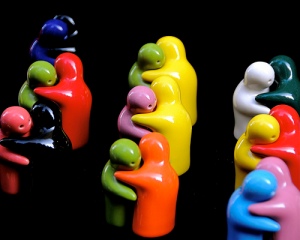
Hugging before bed rule: Our first few months in DC were wrought with confusion, tears, frustration, excitement and recent-college-grad-20-something angst. At that point we realized that if we were going to survive here, we had to do it together. So, we enacted a hugging rule in our apartment. Every night before bed, you have to hug. This has begun to apply to guests, but mostly, it is for us. So that at the end of the day whether it was the most trying or the shiniest day, we knew there was a hug at the end of it. Someone saying that no matter what, even if we are fighting, even if I leave the dishes in the sink and you haven’t showered after biking home, I love you. And I am going to show you that. Every. Day. Call it cheesy. But you know you wish you had that guarantee, too. Well, you do. Just come on over.
Cleaning: One could say I receive love well through acts of service (love languages anyone?). I admit that I am likely not the easiest person to live with (hi new roomies—don’t read this part, I’m awesome. You will love me). I ask for things like closing the shower curtain after every shower, making sure the dish towels are folded (and clean!) when hung on the oven door, that the knob in the shower is turned in a downward direction so that when I am showering at 5 am the water hits my feet first, not my face unexpectedly (does anyone else hate that?!). And she does it. She listens to my weird idiosyncrasies and remembers them and follows them. Who does that? Awesome. Also, she takes it a step further. One night, I had 6 people over for dinner when she was out. We headed straight to the bar for a few drinks after dinner with little clean up. I roll in well after midnight and the place is spotless. She cleaned up MY mess. Amazing.
Blenders: She likes to make smoothies in the morning. They include special, fun, healthy things for her high cholesterol—which annoys her greatly and rightfully as she exercises practically daily and never met a vegetable she didn’t like. So, one morning when MY friends are sleeping on the couch, I wake up and she is gone. As I pass her room I see a blender on the floor. She took the blender into her room so as not to disturb MY guests.
Seriously. Does it get much better than this? No. Until we spontaneously do a double jumping high five in the kitchen or on the Frisbee field (you had to be there).
However, I doubt I will have to sacrifice much with my new roommates. The first question they asked me after I committed to moving in was: what would you like your theme to be for your housewarming party? Also, they have a roof deck. On which they built a garden.
Throwing Caution to the Wind: Over-Scheduled Style
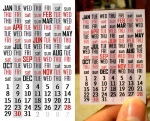 Photo via Flickr by eliazar
Photo via Flickr by eliazar
There is a can of paint in my car with lines of dried dripped paint all down the sides. There are rollers and brushes that were yesterday wet with paint, wrapped in bags and tape and fear of messiness and today are probably dried and ruined also in my trunk. There is a friend’s ladder, another friend’s paint rollers and any number of things that I should have attended to yesterday, but did not. And it was wonderful.
Yesterday, I biked along the river, sat in a new, thriving church, painted a wall, installed lights, sang at the top of my lungs with no fear of judgment, went to a movie I hadn’t researched the times for 3 days before, ate gelato and pizza and hung out with some great friends and did not check my email for hours at a time. One of them said to me yesterday, “you do too much.” I was torn between immediately agreeing with him and defending my over-saturated schedule.
To give a little background here: I tend to say yes to things that I think deserve my attention and once I am committed, I am committed 300%. Fortunately or unfortunately, I think a lot of things deserve my attention. Therefore, when I look at my 7 color-coded calendars to see what is coming for the day, I am excited. I get to play kickball, or Frisbee, train for my next triathlon or volunteer at church, indirectly care for women in Rwanda by being their voices here through trying to learn how to run a non-profit advisory board as its youngest member, install a photography show, work for a cause I believe in, and try to be a good friend to quite a few different groups of people all over DC and the world.
Recently I asked another friend in semi-seriousness, “How do you know when you are doing too much?” He responded, “When it gets in the way of your life.” The things in the paragraph above are my life, very purposely and passionately so, but I think he meant that it is too much when your activities begin to define you and control you. Therefore, how do I gain that sense of freedom I had yesterday which paralleled the freedom I felt in jumping on a plane to Peru a week after buying a ticket or during my job search (more on this later as to why I was the happiest I have been in a long time while unemployed…)? Do I plan less? Care about fewer people? Leave more open space in my schedule? Draw more boundaries? Or less? Or do I just keep moving forward surrounding myself with people who nudge me when I have become too confined by my schedule to throw it all away for a day and just have an afternoon of spontaneity?
In fact, I think I will just have to move in with said people. My friends who made my blissful Sunday possible, are my soon to be roommates come September, and I look forward to ditching my schedule more often and telling you the resulting tales.
